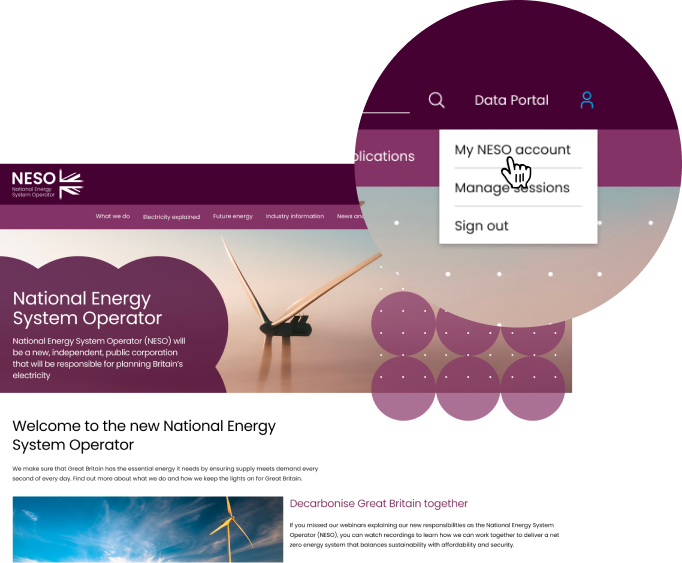
System Operability Framework (SOF)
The System Operability Framework (SOF) takes a holistic view of the changing energy landscape to assess the future operation of Britain's electricity networks.
The SOF combines insight from the Future Energy Scenarios (FES) with a programme of technical assessments to identify medium-term and long-term requirements for operability.
Evolving year-on-year
Through extensive industry interaction, the SOF evolves year‑on‑year to meet changing operational and stakeholder needs.
Growth of low carbon and renewable generation, closures of conventional thermal power stations and changing interactions across the whole of the power system. These are just a few of the areas considered in the context of a rapidly changing power system.

Operability Strategy Report 2025
The OSR outlines the operability challenges we expect to face as we transition to a clean power electricity system in 2030 and a net zero system beyond 2030. The report covers seven key areas of system operability: adequacy, flexibility, frequency, thermal, voltage, stability and restoration. This year it uses CP30 analysis and data to illustrate what operating a clean power system could look like.
Stability deep dive webinar - 28 March 2023
Following the Operability Strategy Webinar held on 24 January, we asked if you would like a 'deep dive' on a particular topic. Stability was the most popular and we ran an additional webinar on 28 March covering more detail on our stability requirements, how we measure system strength, and how we are evolving the procurement of stability services.
Power quality in the GB transmission network
Power quality is critical to the performance of the plant and equipment connected to the power network. Poor power quality can reduce efficiency, cause excessive heating, or even damage the assets. Driven by the net zero targets, the penetration of inverter-based resources (IBR) will continue to increase, reducing the system strength in certain areas of the network.
There is a direct correlation between system strength, traditionally measured by the short circuit levels (SCL), and some power quality aspects, including harmonics, voltage unbalance, and voltage flicker. This report discusses the main aspects of power quality in the future GB transmission network.
Provision of short circuit level data
This paper explores options for defining and referencing the short circuit level (SCL) for new and existing connections to the GB electricity system. As more non-synchronous generations connect to the electricity system, a reduction in traditional synchronous generators impacts system stability. We describe why the short circuit level is important and explore several options for defining its requirements for new and existing generation. We are also seeking industry feedback on which of these options provides the optimal solution for defining short circuit level.
Download paper Feedback questions
Removing barriers to flexibility on the grid: interconnection
By 2025, interconnectors will become a key source of flexibility and constitute a significant portion of the overall generation mix. Accessing flexibility and ancillary services on interconnectors will become key for system operability, and an important pillar in our ambition for competition everywhere. Following the publication of the BEIS Smart Systems and Flexibility plan, we’ve been looking into the barriers to interconnector participation in the dynamic containment market. Our report outlines those barriers and what mitigating actions could be taken.
National trends and insights
The UK’s transition to a low carbon economy brings many new challenges and opportunities to how NESO operates the GB electricity system, with flexibility becoming an increasingly valuable characteristic. At NESO, we continuously work with industry stakeholders to transform our operations and deliver the right market solutions at the right time to benefit the end consumer. This document takes the output of our ETYS and NOA processes in 2020, and looks further into the technical issues that may need addressing to operate a low carbon electricity system successfully.
Low demand - operability challenges from COVID-19 (spring and summer 2020)
The COVID-19 pandemic led to partial or total lock downs in Great Britain in the spring of 2020, which in turn caused a reduction in electricity demand. This low demand, combined with large renewable output at times, resulted in a high penetration of non-synchronous machines on the system. This combination led to challenges with demand forecasting and maintaining flexibility for system integrity, voltage profiles, and system stability. This paper provides a brief on the challenges of 2020 which ESO faced, the measures applied to tackle the challenges, and the work we will look to carry out to improve the system operability in the future.
The potential operability benefits of virtual synchronous machines and related technologies
At NESO, we are always looking at ways to enable new technologies to connect to the network safely, securely and efficiently. This report discusses how new technologies can support system stability by adopting virtual synchronous machine (VSM) technologies and associated control approaches, enabling the transition to a zero carbon system.
More reports
Operability impact of Distributed Storage and Electric Vehicles
The high penetration of these devices would alter demand. With appropriate market and framework design, storage and electric vehicles will be able to support electricity system operation and be enablers to the decarbonization transition.
Operating a low inertia system
We are always looking at how to best operate the network as we see reductions in system inertia. This report address the future challenges we see ahead of us as we transition to a zero carbon system.
Past frequency events
This report provides the brief summary of significant frequency events which have previously been provided in the System Incident report to the Grid Code Review Panel.
Impact of declining short circuit levels
We are identifying and quantifying system requirements which are affected by reductions in Short Circuit Level and we share some of our work in this document.
Whole system short circuit level
Short circuit levels on the distribution networks are increasing driven by the growth in distributed generation and demand. This report looks at how these two trends interact and their net effect on the whole system.
Regional trends and insights
Changes in the generation and demand are effecting how the power system is operated on a regional basis. Find out about our latest analysis by downloading the report.
Voltage and Frequency Dependency
Traditionally, voltage and frequency have been treated independently when considering operability. In the future, they will interact more. Find out about our latest analysis by downloading the report.
Past SOF documents
Operability Strategy Report
| Name | Published Sort ascending |
|---|---|
| Operability Strategy Report 2025 - print ready | 28 Mar 2025 |
| Operability Strategy Report 2025 - interactive | 28 Mar 2025 |
| Operability Strategy Report 2024 | 21 Dec 2022 |
| Operability strategy report 2023 | 21 Dec 2022 |
| Operability Strategy Report 2022 | 21 Dec 2021 |
| Operability Strategy Report 2021 | 8 Jan 2021 |
| Operability Strategy Report 2020 | 31 Dec 2019 |
| Operability Strategy Report 2019 update | 26 Jun 2019 |
| Operability Strategy Report 2018 | 30 Nov 2018 |
SOF 2016
| Name | Published Sort ascending |
|---|---|
| SOF 2016 - Data Tables | 3 Jan 2017 |
| SOF 2016 - Full Non-interactive Document | 30 Nov 2016 |
| SOF 2016 - Full Interactive Document | 30 Nov 2016 |
| SOF 2016 - September Post-assessment Webinar | 27 Sep 2016 |
| SOF 2016 - Launch Event Slides - Key Messages and Insights | 12 Sep 2016 |
| SOF 2016 - July Mid-assessment Webinar | 27 Jul 2016 |
| SOF 2016 - May Pre-assessment Webinar | 6 Jul 2016 |
SOF 2015
| Name | Published Sort ascending |
|---|---|
| SOF 2015 - Full Document | 30 Nov 2015 |
| SOF 2015 - Summary | 30 Nov 2015 |
| SOF 2015 - Launch Event Slides | 12 Jan 2015 |
SOF 2014
| Name | Published Sort ascending |
|---|---|
| SOF 2014 - Full Document | 9 Oct 2014 |
Future of Energy updates
Subscribe to our mailing list and we'll let you know as soon as we publish any of our future of energy documents.
Get in touch
Contact us if you have a question, want to share some insight or have feedback.










